Abstract
BACKGROUND: Patients with anxiety and depression often have bowel symptoms. Until now, studies investigating a link between altered bowel habit and psychological illness have focused on patients with disturbed defecation presenting to gastroenterologists. AIMS: To determine whether patients with anxiety and depression have objective evidence of abnormal intestinal transit irrespective of any bowel symptoms. METHODS: 21 psychiatric outpatients fulfilling research criteria for generalised anxiety disorder and/or major depression, and 21 healthy volunteers were studied. Orocaecal transit time (OCTT) was measured by lactulose hydrogen breath test. Whole gut transit time (WGTT) was measured by abdominal radiography after ingestion of radio-opaque markers. RESULTS: Median (range) WGTT was shorter in patients with anxiety (14 (6-29) hours) than in patients with depression (49 (35-71) hours) (p < 0.001), and controls (42 (10-68) hours) (p < 0.001). In patients with anxiety, orocaecal transit time was shorter (60 (10-70) minutes) than in patients with depression (110 (60-180) minutes) (p < 0.01), and shorter than in controls (75 (50-140)) minutes (p < 0.05). The prolongation of transit times in depression compared with controls was not significant. However, WGTT correlated with both the Beck Depression Inventory score (r = 0.59, p < 0.01) and the depression score of the Hospital Anxiety and Depression scale (r = 0.66, p < 0.001). CONCLUSIONS: These objective measurements of intestinal transit in affective disorders are consistent with clinical impressions that anxiety is associated with increased bowel frequency, and depressed patients tend to be constipated; mood has an effect on intestinal motor function.
Full text
PDF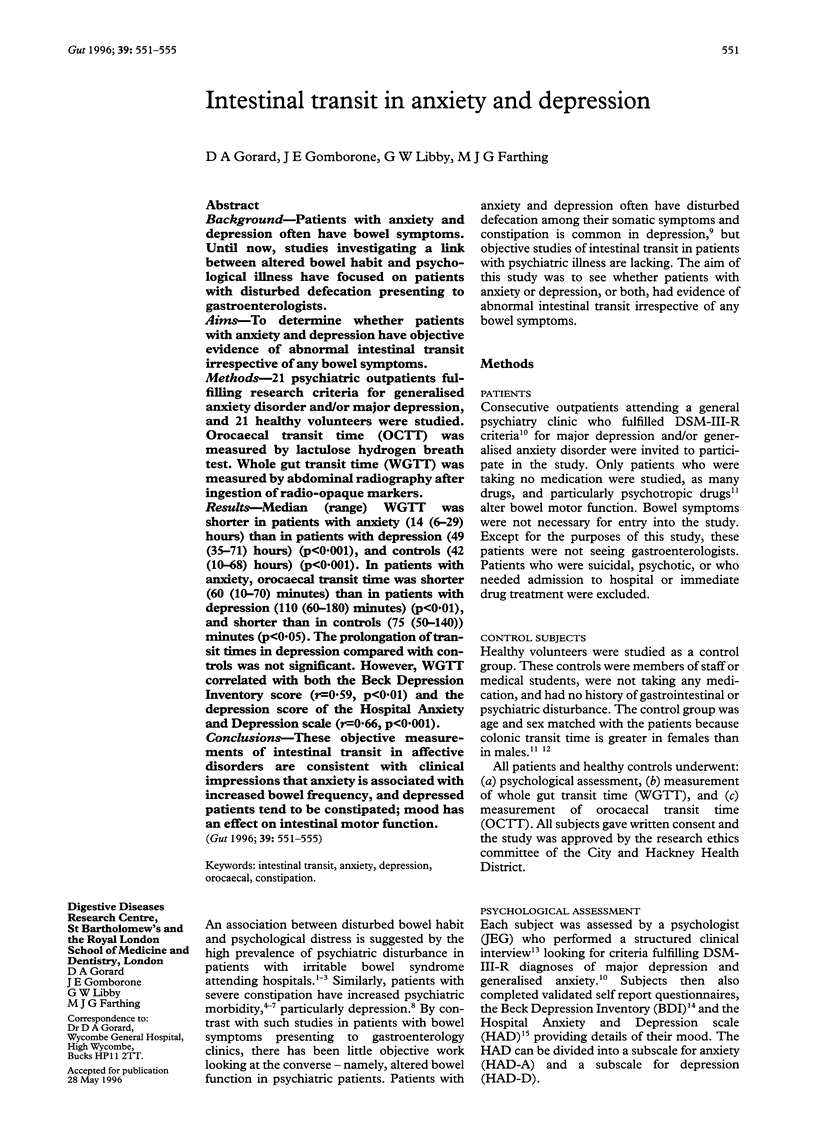
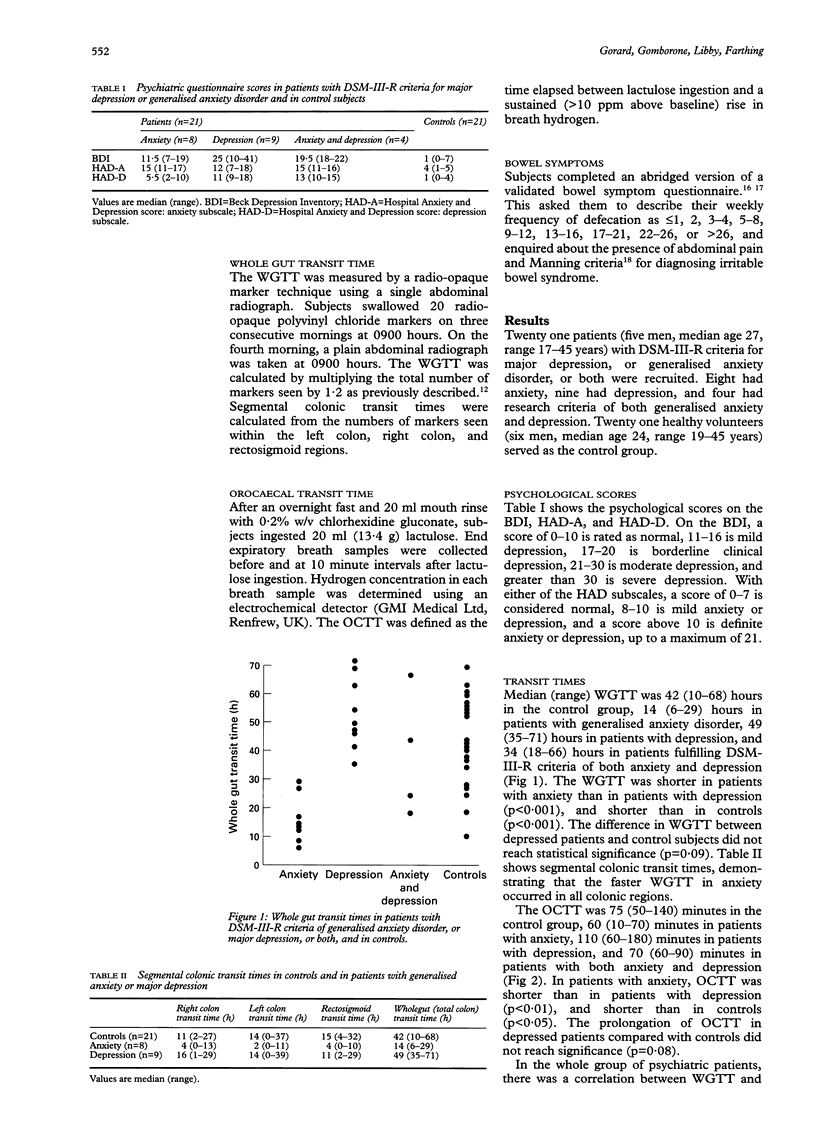
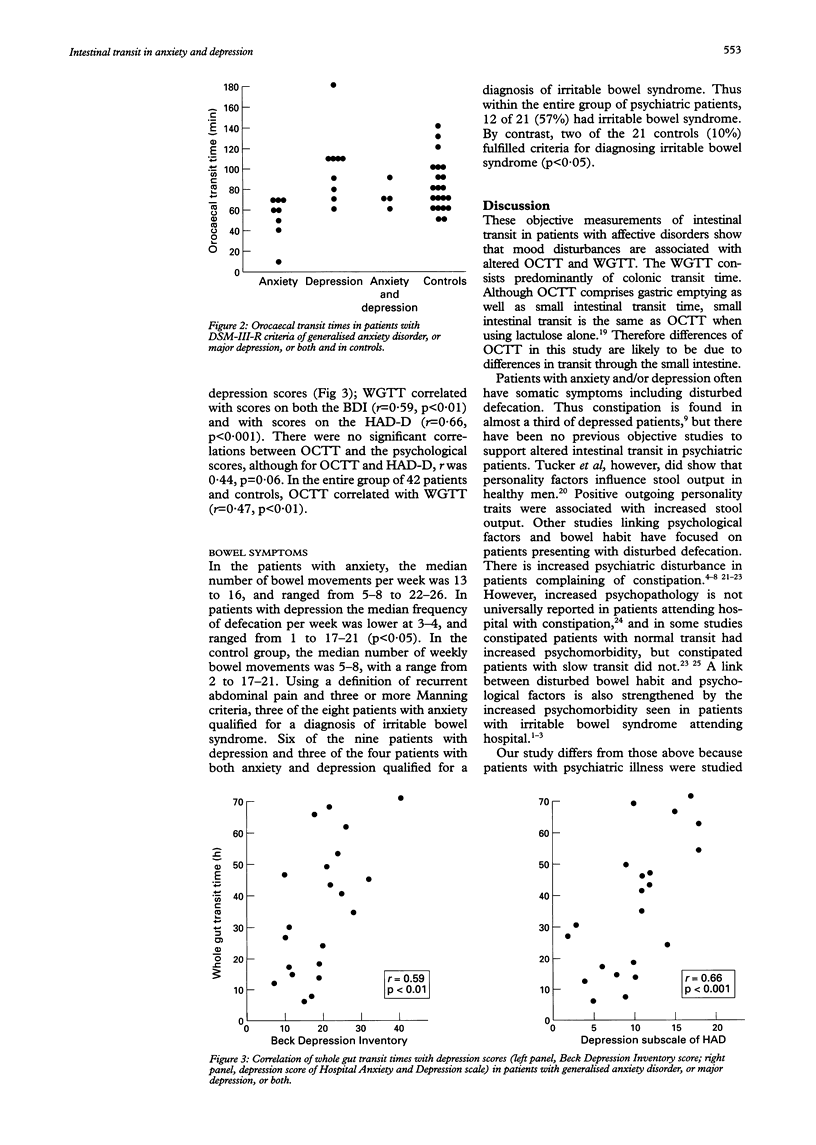
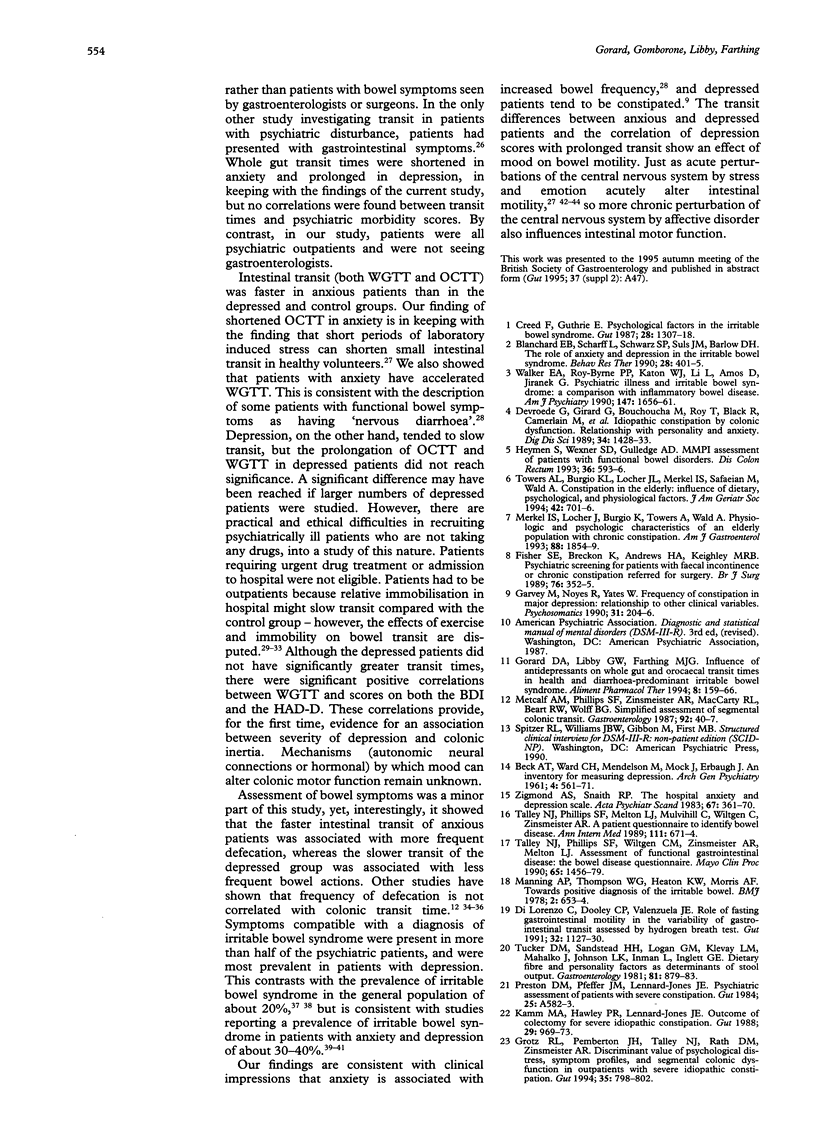
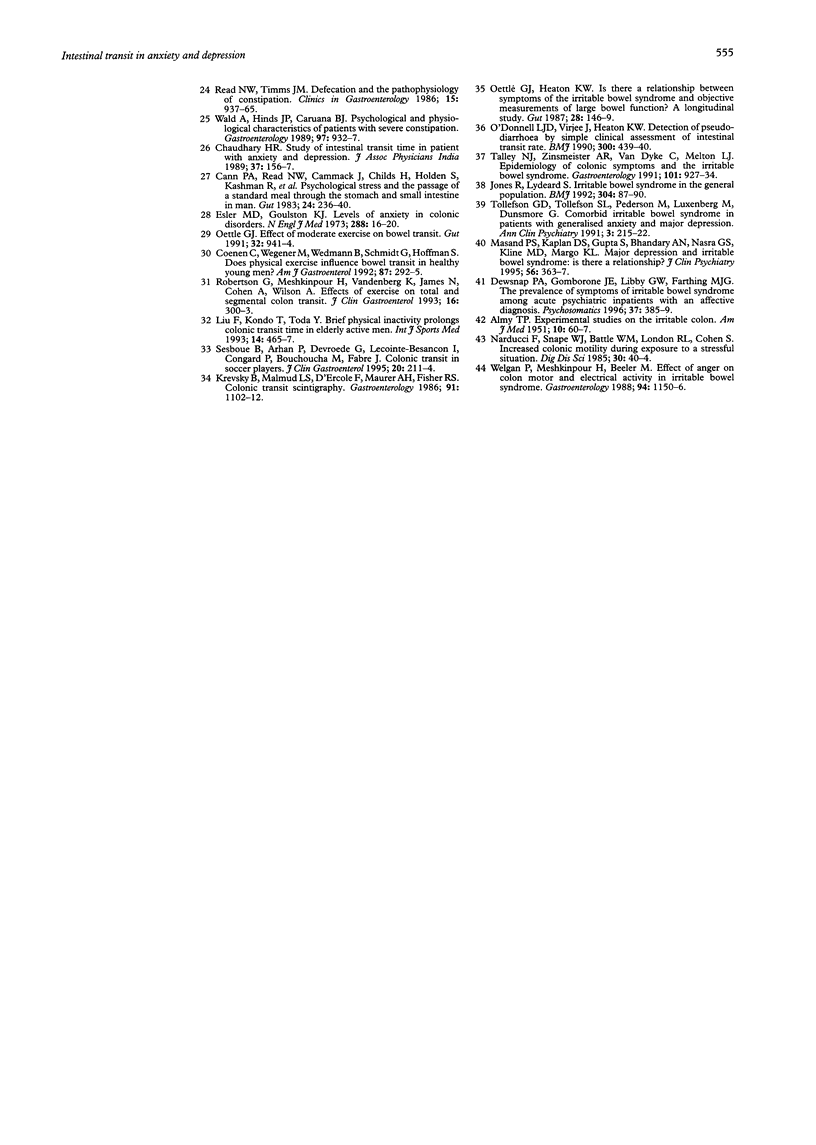
Selected References
These references are in PubMed. This may not be the complete list of references from this article.
- ALMY T. P. Experimental studies on the irritable colon. Am J Med. 1951 Jan;10(1):60–67. doi: 10.1016/0002-9343(51)90219-7. [DOI] [PubMed] [Google Scholar]
- BECK A. T., WARD C. H., MENDELSON M., MOCK J., ERBAUGH J. An inventory for measuring depression. Arch Gen Psychiatry. 1961 Jun;4:561–571. doi: 10.1001/archpsyc.1961.01710120031004. [DOI] [PubMed] [Google Scholar]
- Blanchard E. B., Scharff L., Schwarz S. P., Suls J. M., Barlow D. H. The role of anxiety and depression in the irritable bowel syndrome. Behav Res Ther. 1990;28(5):401–405. doi: 10.1016/0005-7967(90)90159-g. [DOI] [PubMed] [Google Scholar]
- Cann P. A., Read N. W., Cammack J., Childs H., Holden S., Kashman R., Longmore J., Nix S., Simms N., Swallow K. Psychological stress and the passage of a standard meal through the stomach and small intestine in man. Gut. 1983 Mar;24(3):236–240. doi: 10.1136/gut.24.3.236. [DOI] [PMC free article] [PubMed] [Google Scholar]
- Chaudhary H. R. Study of intestinal transit time in patient with anxiety and depression. J Assoc Physicians India. 1989 Feb;37(2):156–157. [PubMed] [Google Scholar]
- Coenen C., Wegener M., Wedmann B., Schmidt G., Hoffmann S. Does physical exercise influence bowel transit time in healthy young men? Am J Gastroenterol. 1992 Mar;87(3):292–295. [PubMed] [Google Scholar]
- Creed F., Guthrie E. Psychological factors in the irritable bowel syndrome. Gut. 1987 Oct;28(10):1307–1318. doi: 10.1136/gut.28.10.1307. [DOI] [PMC free article] [PubMed] [Google Scholar]
- Devroede G., Girard G., Bouchoucha M., Roy T., Black R., Camerlain M., Pinard G., Schang J. C., Arhan P. Idiopathic constipation by colonic dysfunction. Relationship with personality and anxiety. Dig Dis Sci. 1989 Sep;34(9):1428–1433. doi: 10.1007/BF01538081. [DOI] [PubMed] [Google Scholar]
- Dewsnap P., Gomborone J., Libby G., Farthing M. The prevalence of symptoms of irritable bowel syndrome among acute psychiatric inpatients with an affective diagnosis. Psychosomatics. 1996 Jul-Aug;37(4):385–389. doi: 10.1016/S0033-3182(96)71553-0. [DOI] [PubMed] [Google Scholar]
- Di Lorenzo C., Dooley C. P., Valenzuela J. E. Role of fasting gastrointestinal motility in the variability of gastrointestinal transit time assessed by hydrogen breath test. Gut. 1991 Oct;32(10):1127–1130. doi: 10.1136/gut.32.10.1127. [DOI] [PMC free article] [PubMed] [Google Scholar]
- Esler M. D., Goulston K. J. Levels of anxiety in colonic disorders. N Engl J Med. 1973 Jan 4;288(1):16–20. doi: 10.1056/NEJM197301042880104. [DOI] [PubMed] [Google Scholar]
- Fisher S. E., Breckon K., Andrews H. A., Keighley M. R. Psychiatric screening for patients with faecal incontinence or chronic constipation referred for surgical treatment. Br J Surg. 1989 Apr;76(4):352–355. doi: 10.1002/bjs.1800760413. [DOI] [PubMed] [Google Scholar]
- Garvey M., Noyes R., Jr, Yates W. Frequency of constipation in major depression: relationship to other clinical variables. Psychosomatics. 1990 Spring;31(2):204–206. doi: 10.1016/S0033-3182(90)72196-2. [DOI] [PubMed] [Google Scholar]
- Gorard D. A., Libby G. W., Farthing M. J. Influence of antidepressants on whole gut and orocaecal transit times in health and irritable bowel syndrome. Aliment Pharmacol Ther. 1994 Apr;8(2):159–166. doi: 10.1111/j.1365-2036.1994.tb00273.x. [DOI] [PubMed] [Google Scholar]
- Grotz R. L., Pemberton J. H., Talley N. J., Rath D. M., Zinsmeister A. R. Discriminant value of psychological distress, symptom profiles, and segmental colonic dysfunction in outpatients with severe idiopathic constipation. Gut. 1994 Jun;35(6):798–802. doi: 10.1136/gut.35.6.798. [DOI] [PMC free article] [PubMed] [Google Scholar]
- Heymen S., Wexner S. D., Gulledge A. D. MMPI assessment of patients with functional bowel disorders. Dis Colon Rectum. 1993 Jun;36(6):593–596. doi: 10.1007/BF02049867. [DOI] [PubMed] [Google Scholar]
- Jones R., Lydeard S. Irritable bowel syndrome in the general population. BMJ. 1992 Jan 11;304(6819):87–90. doi: 10.1136/bmj.304.6819.87. [DOI] [PMC free article] [PubMed] [Google Scholar]
- Kamm M. A., Hawley P. R., Lennard-Jones J. E. Outcome of colectomy for severe idiopathic constipation. Gut. 1988 Jul;29(7):969–973. doi: 10.1136/gut.29.7.969. [DOI] [PMC free article] [PubMed] [Google Scholar]
- Krevsky B., Malmud L. S., D'Ercole F., Maurer A. H., Fisher R. S. Colonic transit scintigraphy. A physiologic approach to the quantitative measurement of colonic transit in humans. Gastroenterology. 1986 Nov;91(5):1102–1112. [PubMed] [Google Scholar]
- Liu F., Kondo T., Toda Y. Brief physical inactivity prolongs colonic transit time in elderly active men. Int J Sports Med. 1993 Nov;14(8):465–467. doi: 10.1055/s-2007-1021212. [DOI] [PubMed] [Google Scholar]
- Manning A. P., Thompson W. G., Heaton K. W., Morris A. F. Towards positive diagnosis of the irritable bowel. Br Med J. 1978 Sep 2;2(6138):653–654. doi: 10.1136/bmj.2.6138.653. [DOI] [PMC free article] [PubMed] [Google Scholar]
- Masand P. S., Kaplan D. S., Gupta S., Bhandary A. N., Nasra G. S., Kline M. D., Margo K. L. Major depression and irritable bowel syndrome: is there a relationship? J Clin Psychiatry. 1995 Aug;56(8):363–367. [PubMed] [Google Scholar]
- Merkel I. S., Locher J., Burgio K., Towers A., Wald A. Physiologic and psychologic characteristics of an elderly population with chronic constipation. Am J Gastroenterol. 1993 Nov;88(11):1854–1859. [PubMed] [Google Scholar]
- Metcalf A. M., Phillips S. F., Zinsmeister A. R., MacCarty R. L., Beart R. W., Wolff B. G. Simplified assessment of segmental colonic transit. Gastroenterology. 1987 Jan;92(1):40–47. doi: 10.1016/0016-5085(87)90837-7. [DOI] [PubMed] [Google Scholar]
- Narducci F., Snape W. J., Jr, Battle W. M., London R. L., Cohen S. Increased colonic motility during exposure to a stressful situation. Dig Dis Sci. 1985 Jan;30(1):40–44. doi: 10.1007/BF01318369. [DOI] [PubMed] [Google Scholar]
- O'Donnell L. J., Virjee J., Heaton K. W. Detection of pseudodiarrhoea by simple clinical assessment of intestinal transit rate. BMJ. 1990 Feb 17;300(6722):439–440. doi: 10.1136/bmj.300.6722.439. [DOI] [PMC free article] [PubMed] [Google Scholar]
- Oettlé G. J. Effect of moderate exercise on bowel habit. Gut. 1991 Aug;32(8):941–944. doi: 10.1136/gut.32.8.941. [DOI] [PMC free article] [PubMed] [Google Scholar]
- Oettlé G. J., Heaton K. W. Is there a relationship between symptoms of the irritable bowel syndrome and objective measurements of large bowel function? A longitudinal study. Gut. 1987 Feb;28(2):146–149. doi: 10.1136/gut.28.2.146. [DOI] [PMC free article] [PubMed] [Google Scholar]
- Read N. W., Timms J. M. Defecation and the pathophysiology of constipation. Clin Gastroenterol. 1986 Oct;15(4):937–965. [PubMed] [Google Scholar]
- Robertson G., Meshkinpour H., Vandenberg K., James N., Cohen A., Wilson A. Effects of exercise on total and segmental colon transit. J Clin Gastroenterol. 1993 Jun;16(4):300–303. doi: 10.1097/00004836-199306000-00006. [DOI] [PubMed] [Google Scholar]
- Sesboü B., Arhan P., Devroede G., Lecointe-Besançon I., Congard P., Bouchoucha M., Fabre J. Colonic transit in soccer players. J Clin Gastroenterol. 1995 Apr;20(3):211–214. doi: 10.1097/00004836-199504000-00010. [DOI] [PubMed] [Google Scholar]
- Talley N. J., Phillips S. F., Melton J., 3rd, Wiltgen C., Zinsmeister A. R. A patient questionnaire to identify bowel disease. Ann Intern Med. 1989 Oct 15;111(8):671–674. doi: 10.7326/0003-4819-111-8-671. [DOI] [PubMed] [Google Scholar]
- Talley N. J., Phillips S. F., Wiltgen C. M., Zinsmeister A. R., Melton L. J., 3rd Assessment of functional gastrointestinal disease: the bowel disease questionnaire. Mayo Clin Proc. 1990 Nov;65(11):1456–1479. doi: 10.1016/s0025-6196(12)62169-7. [DOI] [PubMed] [Google Scholar]
- Talley N. J., Zinsmeister A. R., Van Dyke C., Melton L. J., 3rd Epidemiology of colonic symptoms and the irritable bowel syndrome. Gastroenterology. 1991 Oct;101(4):927–934. doi: 10.1016/0016-5085(91)90717-y. [DOI] [PubMed] [Google Scholar]
- Towers A. L., Burgio K. L., Locher J. L., Merkel I. S., Safaeian M., Wald A. Constipation in the elderly: influence of dietary, psychological, and physiological factors. J Am Geriatr Soc. 1994 Jul;42(7):701–706. doi: 10.1111/j.1532-5415.1994.tb06527.x. [DOI] [PubMed] [Google Scholar]
- Tucker D. M., Sandstead H. H., Logan G. M., Jr, Klevay L. M., Mahalko J., Johnson L. K., Inman L., Inglett G. E. Dietary fiber and personality factors as determinants of stool output. Gastroenterology. 1981 Nov;81(5):879–883. [PubMed] [Google Scholar]
- Wald A., Hinds J. P., Caruana B. J. Psychological and physiological characteristics of patients with severe idiopathic constipation. Gastroenterology. 1989 Oct;97(4):932–937. doi: 10.1016/0016-5085(89)91500-x. [DOI] [PubMed] [Google Scholar]
- Walker E. A., Roy-Byrne P. P., Katon W. J., Li L., Amos D., Jiranek G. Psychiatric illness and irritable bowel syndrome: a comparison with inflammatory bowel disease. Am J Psychiatry. 1990 Dec;147(12):1656–1661. doi: 10.1176/ajp.147.12.1656. [DOI] [PubMed] [Google Scholar]
- Welgan P., Meshkinpour H., Beeler M. Effect of anger on colon motor and myoelectric activity in irritable bowel syndrome. Gastroenterology. 1988 May;94(5 Pt 1):1150–1156. doi: 10.1016/0016-5085(88)90006-6. [DOI] [PubMed] [Google Scholar]
- Zigmond A. S., Snaith R. P. The hospital anxiety and depression scale. Acta Psychiatr Scand. 1983 Jun;67(6):361–370. doi: 10.1111/j.1600-0447.1983.tb09716.x. [DOI] [PubMed] [Google Scholar]


